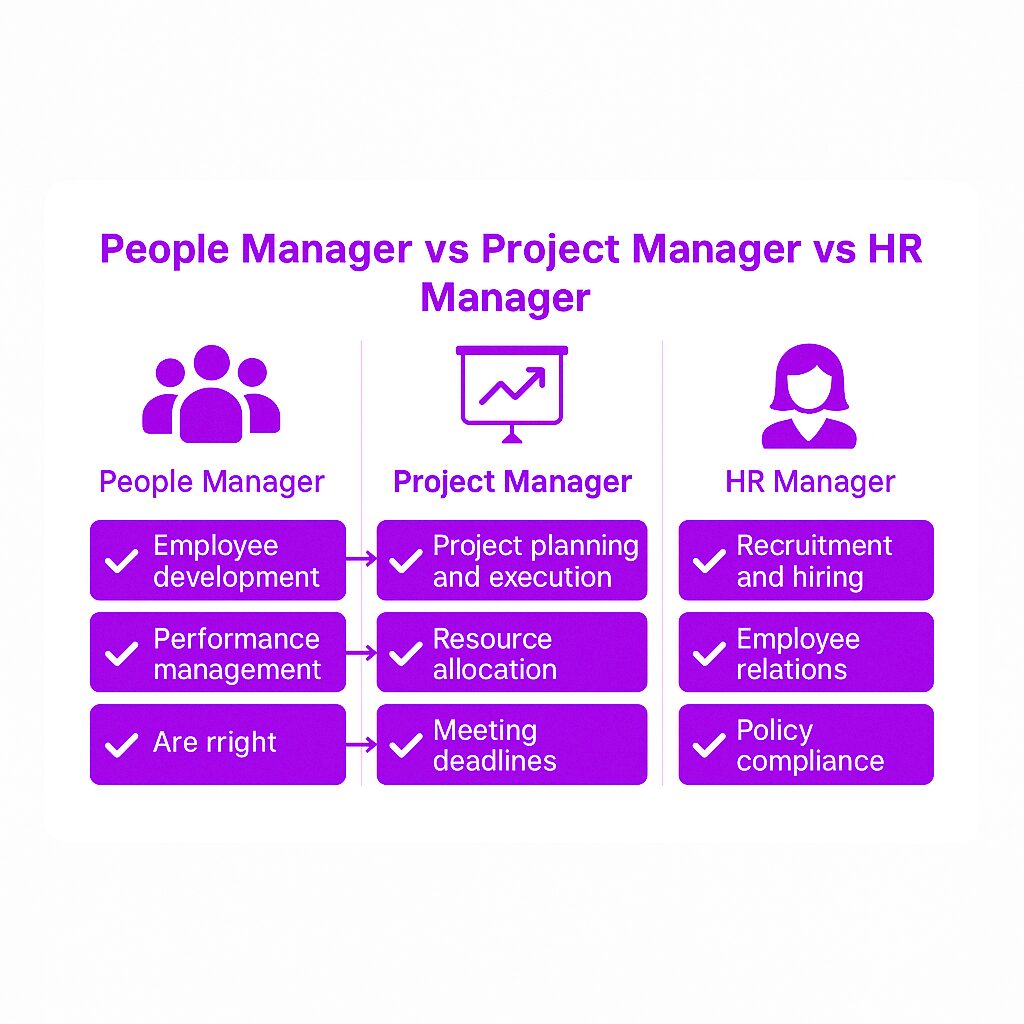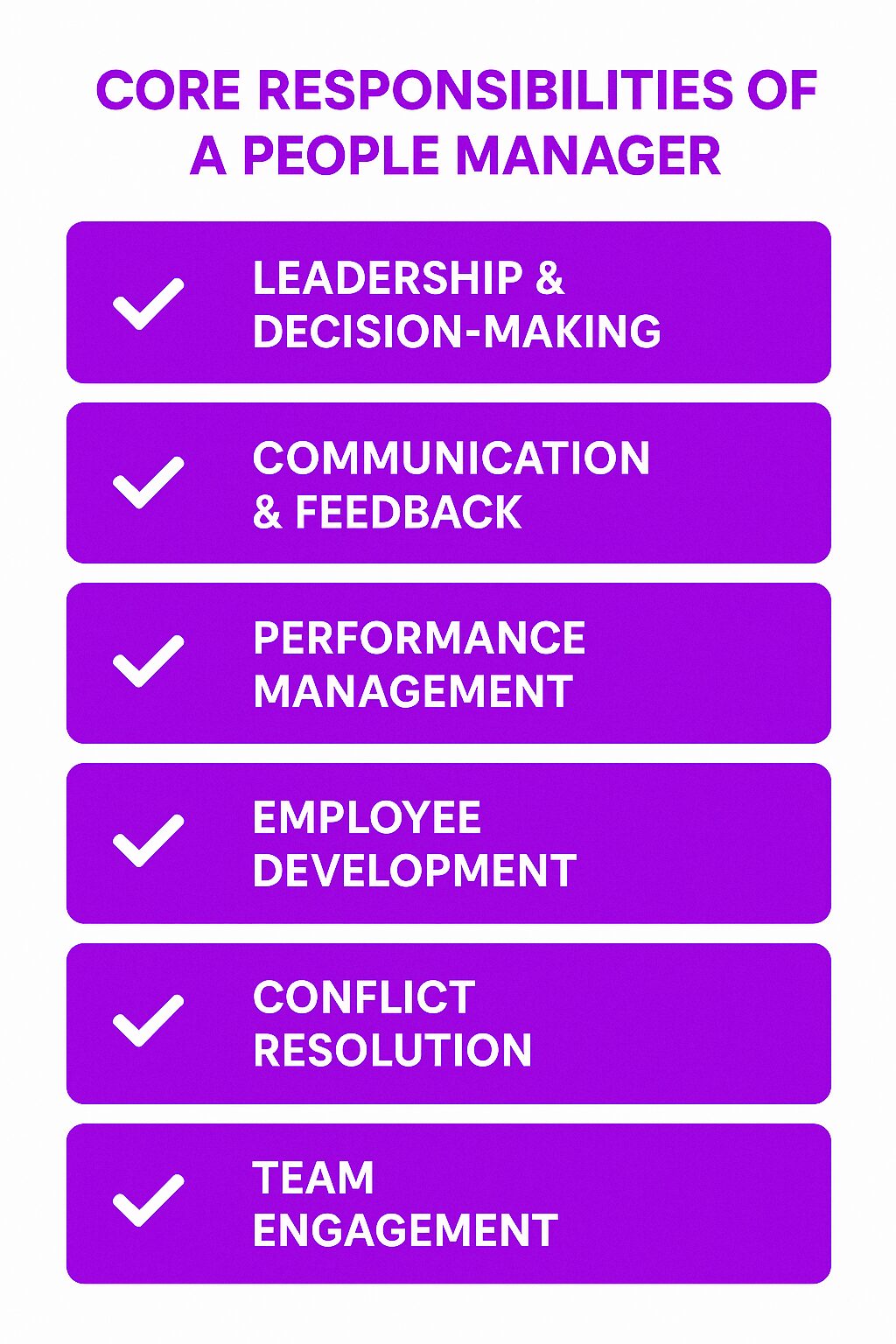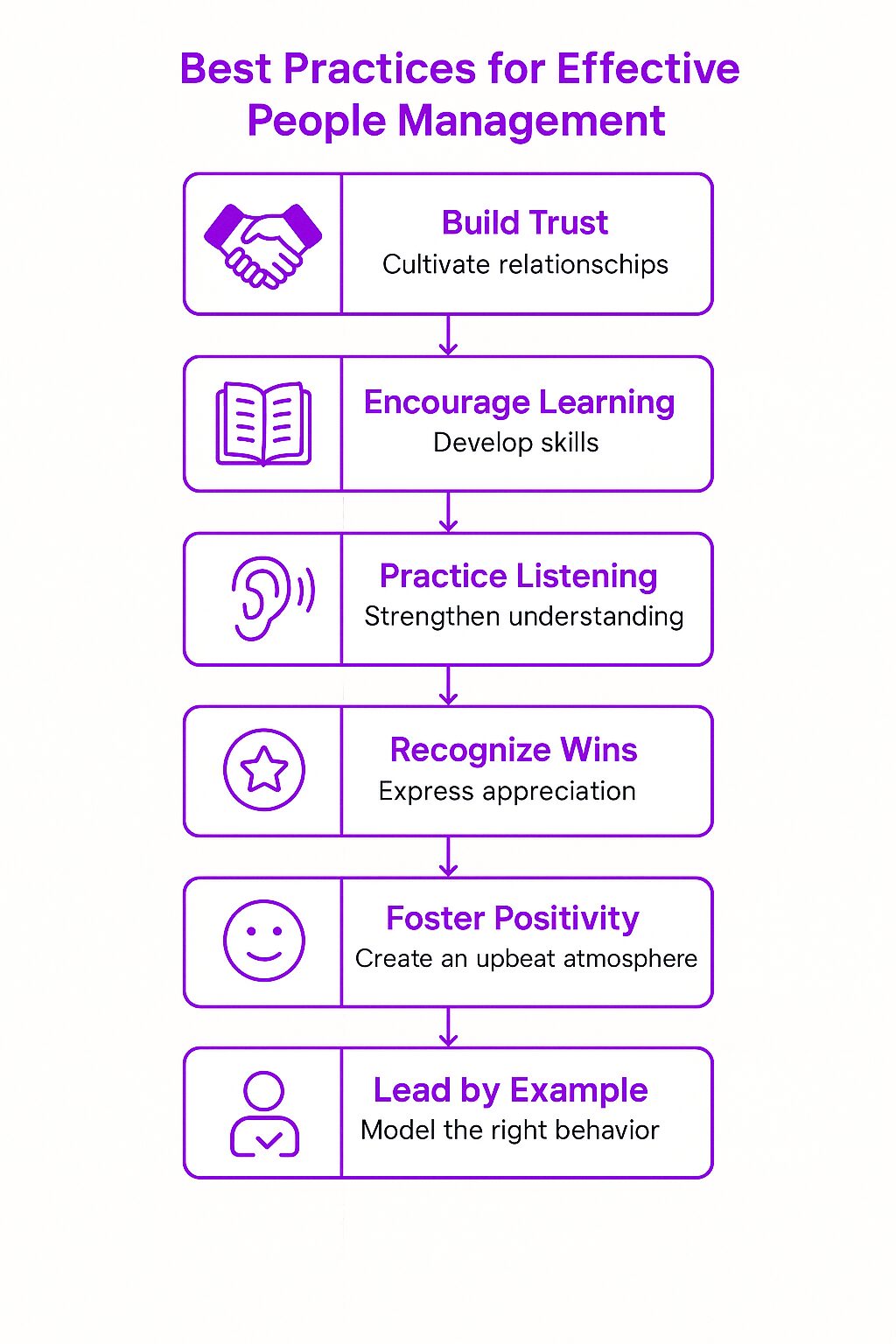What is a People Manager?
A People Manager is responsible for leading and supporting employees within an organization. Their primary role is to oversee teams, develop talent, and create an environment where employees can perform at their best. Unlike project managers, who focus on tasks and deadlines, People Managers focus on the individuals within a team, ensuring they are engaged, productive, and motivated. HR Managers, on the other hand, focus on broader administrative and compliance issues, differentiating them from People Managers who are more concerned with the day-to-day management of team dynamics and employee development.
The Role of a People Manager
People Managers act as a bridge between leadership and employees. HR professionals play a crucial role in supporting People Managers by integrating tools to enhance employee experience. They help translate company goals into actionable steps for their teams while advocating for their employees’ needs. They work closely with human resources, department heads, and executives to create a workplace culture that encourages growth and collaboration.
Key Responsibilities of a People Manager
Leadership and Decision-Making
People Managers guide their teams through change, uncertainty, and growth. They are responsible for setting goals, making strategic decisions, and ensuring their teams stay aligned with the organization’s mission. Good People Managers balance the needs of employees with business objectives, making tough decisions when necessary.
Communication and Feedback
Effective communication is at the core of good people management. People Managers must be clear, direct, and approachable. They provide regular feedback to employees, hold one-on-one meetings, and facilitate team discussions. Open communication builds trust and prevents misunderstandings.
Performance Management
People Managers monitor individual and team performance, helping employees stay on track with their goals. They conduct performance reviews as part of a streamlined performance review process, which automates performance evaluation cycles to efficiently track employee progress and manage reviews. Good performance management ensures employees understand their expectations and how their work contributes to the bigger picture.
Employee Development
A key part of people management is supporting career growth. Professional development is a vital investment in both employees and managers, as it encourages skill enhancement and continuous learning. People Managers provide mentorship, recommend training opportunities, and create development plans. They encourage employees to learn new skills and take on challenges that prepare them for future roles.
Conflict Resolution
Workplace conflicts are inevitable. People Managers help mediate disputes, address concerns, and find fair solutions. They create an open-door policy so employees feel comfortable discussing issues before they escalate.
Team Building and Engagement
Strong teams don’t form on their own. Setting clear and measurable team objectives is crucial for maintaining alignment with the organization’s overarching goals. People Managers foster a sense of community, encourage collaboration, and recognize contributions. They plan team-building activities, celebrate wins, and find ways to keep employees engaged in their work.
Recruiting and Onboarding
Recruiting and onboarding are critical components of people management. A people manager’s role in recruiting involves identifying the best candidates for the job, conducting interviews, and making job offers. Onboarding is the process of integrating new employees into the organization, ensuring they have the necessary tools, training, and support to succeed in their roles.
Effective recruiting and onboarding can significantly impact employee satisfaction, retention, and productivity. People managers should focus on creating a positive candidate experience, providing clear job descriptions, and ensuring a smooth transition for new employees. This includes providing necessary training, introducing them to the team, and setting clear expectations.
Why People Management Matters
Organizations depend on People Managers to maintain a productive and motivated workforce. They help employees feel valued, reduce turnover, and create a positive work environment. Companies with strong People Managers tend to have higher levels of employee satisfaction and better overall performance.
Benefits of Strong People Management
Better Employee Retention
Employees stay at companies where they feel supported. People Managers help reduce turnover by providing guidance, addressing concerns, and recognizing contributions.
Higher Productivity
When employees receive clear direction and feedback, they perform better. People Managers ensure their teams stay focused and aligned with business objectives.
Stronger Workplace Culture
People Managers shape company culture by setting the tone for how teams interact and collaborate. A positive culture improves morale and attracts top talent.
Improved Conflict Resolution
Handling disputes quickly prevents workplace tension from escalating. People Managers act as mediators and help resolve issues fairly.
Employee Growth and Development
Good People Managers invest in their employees’ futures. They provide coaching, mentorship, and opportunities for career progression.
Challenges of People Management
Managing Different Work Styles
Every employee is different. Some need hands-on guidance, while others prefer independence. People Managers must adapt their leadership style to fit their team.
Balancing Employee Needs with Business Goals
It’s not always possible to meet every employee’s requests. Human resource management encompasses strategies for employee engagement and productivity while addressing administrative concerns. People Managers must find a balance between keeping employees happy and ensuring the company remains profitable.
Giving Difficult Feedback
Not all conversations are easy. People Managers sometimes need to address performance issues or behavioral concerns. Delivering constructive feedback while maintaining morale is a skill that takes practice.
Handling Workplace Conflicts
Disagreements happen, and not all conflicts have easy solutions. People Managers must be fair, listen to all sides, and make decisions that benefit both employees and the organization.
Best Practices for Effective People Management
Build Trust and Transparency
Trust is the foundation of strong teams. Be open about company changes, listen to concerns, and follow through on commitments.
Encourage Continuous Learning
Support employees in developing their skills. Developing leadership skills such as emotional intelligence and conflict management is crucial for effectively managing people and navigating business challenges. Offer training, mentorship, and opportunities for growth.
Practice Active Listening
Make sure employees feel heard. Listen without interrupting and ask follow-up questions to show you understand their concerns.
Recognize and Reward Achievements
A simple “thank you” goes a long way. Celebrate team successes and individual contributions.
Foster a Positive Work Environment
Encourage collaboration, respect, and open communication. Address toxic behavior quickly to maintain a healthy workplace culture.
Set Clear Expectations
Employees need to know what is expected of them. Clearly define roles, responsibilities, and performance goals.
Lead by Example
Demonstrate the values and behaviors you want to see in your team. Organizations and HR can support people managers by aligning their objectives with those of employee retention, team performance, and productivity. If you expect accountability and professionalism, show it in your actions.
Managing Direct Reports
Managing direct reports is a key responsibility of people managers. This involves providing guidance, support, and feedback to team members to help them achieve their goals and develop their skills. People managers should focus on building strong relationships with their direct reports, encouraging open communication, and providing regular feedback.
Effective management of direct reports can lead to increased employee engagement, productivity, and job satisfaction. People managers should prioritize regular one-on-one meetings, provide opportunities for growth and development, and recognize and reward outstanding performance.
Building Strong Relationships
Building strong relationships with team members is essential for people managers. This involves creating a positive and inclusive work environment, fostering open communication, and demonstrating empathy and understanding. People managers should prioritize getting to know their team members, understanding their strengths and weaknesses, and providing support and guidance when needed.
Strong relationships with team members can lead to increased trust, loyalty, and job satisfaction. People managers should focus on being approachable, transparent, and fair, and prioritize building a positive and supportive team culture.
Encouraging Open Communication
Encouraging open communication is critical for people managers. This involves creating a safe and supportive environment where team members feel comfortable sharing their thoughts, ideas, and concerns. People managers should prioritize active listening, provide regular feedback, and recognize and reward open communication.
Open communication can lead to increased employee engagement, productivity, and job satisfaction. People managers should focus on creating a culture of transparency, encouraging feedback, and recognizing and addressing concerns in a timely and effective manner.
First-Time Managers
First-time managers face unique challenges as they transition into a leadership role. People managers should prioritize providing support and guidance to first-time managers, including training and development opportunities, mentorship, and regular feedback.
Effective support for first-time managers can lead to increased confidence, competence, and job satisfaction. People managers should focus on providing clear expectations, prioritizing open communication, and recognizing and rewarding outstanding performance.
Related Concepts
Servant Leadership
A leadership style focused on serving employees and helping them succeed.
Emotional Intelligence in Management
Understanding emotions to manage teams effectively.
Employee Engagement
Strategies for keeping employees motivated and involved in their work.
Performance Coaching
Providing structured feedback to help employees improve.
Change Management
Helping employees navigate organizational changes smoothly.
Real-World Examples of People Management
Corporate Leadership
At large companies, People Managers ensure that teams across departments stay aligned with corporate goals.
Startups
In fast-growing companies, People Managers help scale teams while maintaining company culture.
Remote Work
With distributed teams, People Managers play a key role in keeping employees connected and engaged.
HR Collaboration
People Managers work closely with HR to recruit, retain, and develop employees.
Final Thoughts
A People Manager’s job goes beyond overseeing tasks. They build relationships, develop talent, and create a workplace where employees thrive. Strong People Managers contribute to a company’s success by keeping employees engaged, productive, and motivated.







